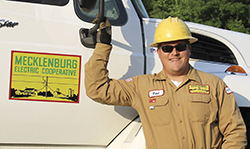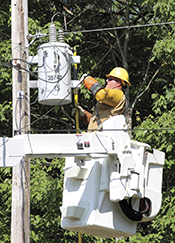|
When Duty Calls ... Linemen Answer
Story by Deborah Blue Winn

Paul Underwood |
The classified ad for a particular job opportunity at
your electric cooperative could read: Lineman Wanted — Must be able to
perform complex technical job assignments under extreme and hazardous
working conditions. Must be willing to work long and unpredictable hours and
be available for weekend and holiday work. Must face terribly adverse
conditions with a smile.
This fabricated advertisement for a lineman’s
job does not make the position sound very desirable. Yet in spite of the
reality of these conditions, there are thousands of people throughout the
United States who have willingly accepted the substantial challenge,
persevered through the comprehensive learning process, and have become
dedicated professionals in the electric cooperative industry. It takes a
special breed to thrive (or survive) in a lineman’s job, and Paul Underwood
is a member of that fraternity.
Paul is a lineman/serviceman at Mecklenburg Electric
Cooperative (MEC) headquartered in Chase City, Va. To achieve his
certification, he underwent four years of apprentice training, which
included classroom time, written tests, extensive training through the
Virginia, Maryland & Delaware Association of Electric Cooperatives, and
on-the-job instruction with crew members at his own cooperative.
“There was so much information to
cram in,” he remarks. “It was such a relief to finally complete the program!
Not everybody makes it.”
|

Whenever linemen are workingaround
energized power lines, they wear personal
protective equipment for their safety.
|
Being a line worker is a
difficult job, as the hypothetical classified ad opposite frankly points
out. Day-to-day assignments require that the
lineman be hoisted by a bucket truck into the air to tediously perform tasks
in extremely dangerous conditions. If the terrain of the job site won’t
permit bucket-truck access, the lineman dons his climbing hooks, safety
harness and 21-pound tool belt and scales to the top of a 40-foot wooden
pole in a skillful manner that may look easy to onlookers but requires
strength and technique.
In addition to being physically demanding, the electric
cooperative lineman’s job is mentally challenging and requires knowledge,
skill and the ability to stay laser-focused on what he is doing. He performs
routine maintenance and system upgrades while the electric lines remain
energized so that the members served by the cooperative will not experience
any interruption to their power.
While working on electric lines or in the substation, the
lineman is in close proximity to 7,200 and 14,400 volts of electricity, and
he is aware of the danger. Therefore, he always wears his personal
protective equipment (PPE) that includes his long-sleeve flame-retardant
shirt, steel-toed boots, rubber sleeves that cover his arms and shoulders,
thick rubber-insulated gloves to protect his hands and arms, his
industry-approved hardhat, and safety glasses to shield his eyes. Even in
100-degree weather, he wears this cumbersome gear, making his working
conditions even hotter.
For this reason, good communication among crew members is
an essential part of working safely. “We never guess about anything or make
assumptions,” says Paul. “Before we begin a job, we have a ‘tail-gate’
session to make certain everyone understands the plan and knows their role.”
He adds, “And when we are working with energized lines, there’s no
conversation going on among us about the ball game that was on TV last
night, or where we plan to go on vacation. We don’t want to be distracted
from the job at hand. We are watching out for each other the entire time.”
Mecklenburg Electric Cooperative President and CEO, John
C. Lee, Jr., comments, “These men put their lives in each other’s hands
every day; and in doing so, they become far more than co-workers, they form
an unbelievably strong bond.” He adds, “A lineman’s job requires skill,
concentration, mental and physical strength, patience, common sense and good
judgment; and it takes a unique individual to be a great lineman. He must be
very tough, well-trained and always utilize his skills in a safe manner.
Linemen are very, very proud of what they do.”
Linemen are “on call” 24/7 to be of service to those
receiving electricity from the cooperative, and perhaps one of the most
demanding parts of their job is when outages occur. In the middle of the
night when a storm is raging, instead of rolling over in bed and going back
to sleep after a loud thunderclap, the lineman may have just received an
outage call and will jump out of bed to report to work. On a summer night he
may be riding down a dark, muddy road looking for the cause of the outage as
lightning flashes around him. In contrast, on a winter night he may be
climbing a wet pole to make repairs while snow and sleet pelt him in the
face. He is willing to brave any weather, day or night, in order to see that
co-op members have electricity.
A lineman knows there will be times when his job will
obligate him to be away from his family. Paul remembers, “Last December I
was hoping I wouldn’t be called to work on the day of my daughter’s first
birthday party. I didn’t want to miss that special occasion!” He pauses and
adds with a smile, “There were no outage calls that day, so I was able to be
there with her and the rest of my family. But I have missed Thanksgiving
dinner, the opening of Christmas presents, my wife’s birthday and other
family gatherings because I was working outages.”

Paul Underwood says there are many reasons
for working safely, but his number-one
reason is his family. Pictured are Paul, his
wife Kendele and their daughter Taylynn.
Photo by Kelly Welles Photography.
|
A lineman’s spouse and children must be supportive of his
occupation and the role he plays in the community, and they must be willing
to make sacrifices with him. Paul’s wife, Kendele, is very understanding and
accepting of that responsibility. She proudly praises her husband, saying,
“Paul is hardworking … he loves what he does, and it shows. It continuously
amazes me how he doesn’t mind having to leave in the middle of the night,
while it’s storming like crazy outdoors … whether it is snow, ice, rain, or
a hurricane … to make his way out into the elements and work long, hard
hours, not knowing when he will return home. He has a passion for helping
others, and I really admire him.”
In spite of working in dangerous and adverse weather
conditions, Paul says, “I like my job … everything about it. I enjoy what I
do. It’s nice to get up in the morning and want to go to work.” Paul
continues, “Yes, we make sacrifices, but everything we do is for our
members. We understand how much they depend on their electric power, and
that they are counting on us to keep it flowing.”
Paul mentions that there have been times when members
have brought Gatorade and cookies to working linemen, and even plates of
home-cooked meals. “I can’t explain how much that means to us after we’ve
been working outages for hours non-stop,” Paul remarks. “And when members
show gratitude by sending thank-you notes and emails or posting on Facebook,
we really appreciate it.”
At the end of a hard day at work, Paul is tired, dirty
and sweaty; but he drives home feeling a sense of satisfaction and
accomplishment for the tasks he and his crew have completed that day. At
home his young daughter, Taylynn, meets him at the door and gives Daddy a
big hug. With her warm little hand she takes his hand and asks to go play on
the swing set that he built for her. When they return to the house, Paul can
take off his boots, cook some steaks on the grill, and spend some relaxing
time with Kendele. She proudly remarks, “Paul juggles the roles of being a
father, husband, friend, and dedicated lineman every day and, surprisingly,
fulfills each perfectly.”
Whenever duty calls, the electric cooperative lineman is
ready to respond and does so aggressively, whether it’s one member without
power, or 1,000. He knows people are relying on him. Being a lineman is not
merely an occupation, but is a willing commitment to the people he serves
and the communities where he plies his important trade. He is driven by
pride in his work and his concern for those who count on him to keep their
lights on.
So whenever you see an electric lineman, give him a
“thumbs up.” A big reason he takes such pride in a very tough job and faces
adverse conditions with a smile is your appreciation.
|